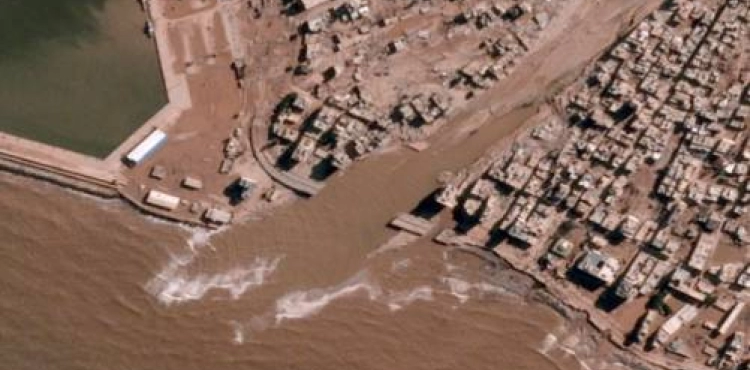A week after the deadly floods that swept Libya, survivors in Derna want answers: Why did the requests to repair the two collapsed dams remain a dead letter and who will help them confront the dangers of epidemics?
Abdul Qader Al-Omrani told AFP from his bed in a hospital in Benghazi, the largest city in eastern Libya, "Two years ago, a leak occurred in the Grand Dam when it was half full. We warned the municipality and demanded reforms."
"Thousands of deaths could have been avoided," said the 48-year-old, who saw the bodies of six of his loved ones washed up in his devastated city. He added that officials who did not carry out reforms "bear responsibility for the deaths."
After a demonstration in which hundreds of residents participated, the head of the eastern government, Osama Hammad, decided on Monday to dissolve the municipal council in Derna and request an investigation.
Likewise, Ezz El-Din Muftah (32 years old), who is in intensive care, held the local authorities responsible.
The private sector employee, whose family survived the floods, said: “It is the fault of the officials who did not do their job and let the two dams collapse.”
The tidal wave that followed the collapse of the two dams turned the heart of the city with a population of 100,000 people into a pile of mud, which rescue teams combed to retrieve the bodies and bulldozers to dig mass graves.
Al-Omrani said, "After all this death, the country has finally become united, and everyone has come to our aid," expressing his conviction that "Derna will be a cause worth defending."
But to achieve that, another survivor in a nearby bed who did not want to reveal his name said, “We need a state.”
This 53-year-old man, who hit his head “on the ceiling after flood waters filled the living room,” explained that there is a need for “billions and a new sewage network,” expressing his gratitude to “civil society.”
But state intervention poses a challenge in Libya, which has been rife with chaos and divisions since the fall of Muammar Gaddafi in 2011, and where two governments are competing for power. The first is based in Tripoli in the west and is headed by Abdul Hamid Al-Dabaiba and is recognized by the United Nations, and the other is in the east of the country, which was struck by the storm, headed by Osama Hammad. It is commissioned by the House of Representatives and supported by the strongman in the east, Field Marshal Khalifa Haftar.
The man added, "Libya has moved from one problem to another, but now we need a state because Derna is devastated and 70,000 people are still threatened by epidemics there."
The 50-year-old, who is waiting to undergo surgery after suffering infections in his hands and broken legs due to swimming in sewage, continued, “People cannot drink water or wash with it. How will they manage their affairs?”
He said that no one imagined that such a “tsunami” would sweep Derna.
In the evening, “we received an alert that the sea level would rise, so I took my wife and four children to take shelter with my in-laws in the mountains overlooking the city.”
When he returned to Derna alone, he sought advice from the local authorities, who assured him that his house was not in the threatened area, according to what he recounted.
After that, everything happened very quickly, Al-Omrani said, adding, “The deaths, the missing, and the destruction of Derna, all of this happened between 03:00 and 04:30 in the morning.”
Suddenly, his house, located near one of the two collapsed dams, was flooded with water. He jumped from a balcony, climbed a tree, and then managed to reach the mountain.
When the waters finally receded, there was “no building, no tree, no life, there was only the mountain... I lived through the end of the world, without exaggeration.”
"I survived the worst terrifying nightmare in the world," he added. When he found his family after an hour and a half of walking among the rubble and bodies, "they thought they saw a ghost. They were almost sure I was dead."












